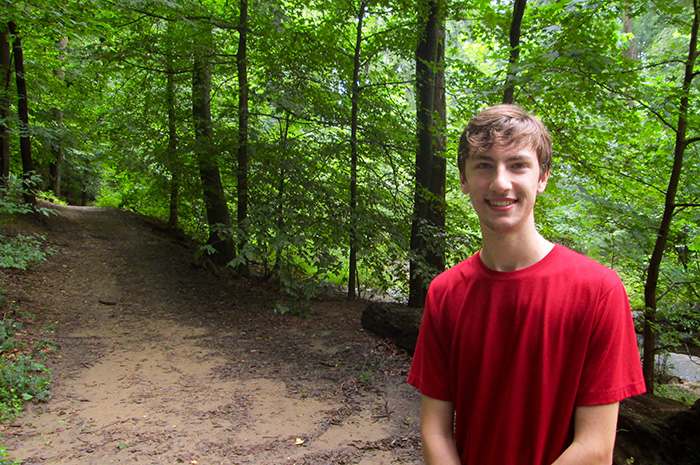Well-Versed

John Kneisley ’16
Last year, award-winning poet John Kneisley ’16 presented original research at an international writing-center conference, and later he turned his presentation into an article for a professional writing newsletter. Kneisley recently received a grant to attend an additional professional conference this fall and will again present at an international conference in the spring. Here, he discusses his research, his passion for poetic verse, his versatile major and the satisfaction he derives from teaching others.
Major:
Clubs, organizations and activities:
Writing Center (co-head tutor and writing associate) and men’s tennis team.
Honors and awards:
Dean’s List, 2014 Academy of American Poets Award (runner-up), 2015 Alice and F. Chapline Moorehead-Barbara Elder Timberlake Award and Alpha Lambda Delta Honor Society.
On choosing a major:
From the beginning, I knew I would major in one of the humanities. I loved to read, and I wanted time to think, discuss and write about what I read. However, I felt as though I could have majored in any humanities discipline, and I put off choosing one because I couldn’t decide. After talking to both professors and peers, I turned my problem into my solution: a major that provided access to all of the humanities and allowed for the most variety in topic exploration. I soon declared a major in English. Thanks to an arsenal of literary approaches, English majors can delve into any of the humanities, and even into some social sciences. I’m thankful for English’s breadth and depth, and the scholarly room it has given me to roam.
Favorite professor:
I have many, most of whom hail from the English department, but here I may only highlight a few. Besides staunchly supporting my academic and personal development, the following have imparted lifelong lessons. Professor [Susan] Feldman (philosophy) taught me that writing short is harder than writing long and imparted the value of concision; Professor [Wendy] Moffat (English) showed me how to stabilize myself within the whirlwind of James Joyce and, by extension, how to be a more patient and scrupulous reader; and [former] Professor [Andy] MacDonald (French) taught me that acting is a means of close reading and deepened my appreciation for French literature by letting me live it on a stage. I’m thankful for all of them—and for Dickinson’s size, which allows for close student-faculty relationships.
Post-Dickinson plans:
I would love to teach. I feel at home when I’m helping someone else to learn and think. Literature, composition and creative writing are the subjects I want to continue to live in. One of my dreams, which I hope to accomplish outside the classroom as well as in it, is to help people appreciate poetry more. It’s not for everyone, I know, but I think it has a lot to offer us even alongside (or within) contemporary media.
If I could have dinner with anyone, living or dead, it would be …
… my girlfriend.
Little-known talent:
I can juggle!
Biggest influences:
Two spring immediately to mind. First, my mom. Her Christian faith and work ethic inspire me to be a resilient and driven person, and I owe every success to her support. She also taught me how to look and how to listen, which are skills easily taken for granted and ones that have helped me reap more from life.
The second is my roommate, Kyle Liss ['16]. The depth of our conversations makes our room intellectually stimulating. I’m a better person because of his friendship and caring.
About my internship:
This summer I worked as a teaching assistant at the Johns Hopkins Center for Talented Youth (CTY). I helped teach a course on creative nonfiction to some of the most brilliant high-school minds I’ve ever met, and through my students, I learned more about myself as a teacher and writer. My instructor gave me the freedom to conduct my own lectures, lead discussions, invent writing assignments and participate in the extensive behind-the-scenes planning required for a successful class. Although the work was physically and mentally exhausting, I rarely saw it as stressful, because I felt so rewarded by my students’ growth. More than anything, CTY taught me that the act of teaching is often the greatest teacher, and that entering the profession requires the mindset of a student.
About my research:
I couldn’t have accomplished any of my Writing Center research without Lisa Wolff, who assists in the direction of our Writing Center. She’s been so willing to help me talk through and revise my work, and I’m honored to have her insight.
Last fall, I presented research at the IWCA/NCPTW conference in Florida and showed that most students ignore the center’s ability to assist with prewriting, which is any writing or thinking one does in preparation to draft. Most students schedule appointments to focus on drafts, yet the idea formulation that precedes the drafting stage is arguably more important. My conclusion was that the center has room to better fulfill its goal of assisting students with any stage of the writing process, and not just the drafting stage. I have recently submitted this research as a paper to Writing Lab Newsletter and included solutions to the issue it exposes.
My main solution is to train tutors to assist students with critical reading. Often students’ drafts suffer not from problems with their writing, but from problems with their reading comprehension or prior literary analysis. Tutoring methodology largely ignores critical reading assistance yet could easily be expanded to include it. This fall, I will pursue the idea of critical reading assistance by means of a grant from the Naylor Workshop for Undergraduate Research in Writing Studies at York College, and I will later present on it at the 2015 IWCA conference in Pittsburgh.
Learn more
- “Poetry in the Making”
- “Renowned Writing Center”
- Department of English
- Writing Center
- Educational Studies
- More Student Snapshots
- Latest News
Published August 10, 2015